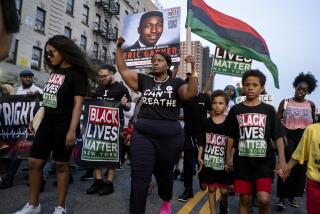Tenn. study: Black workers less supported at work -- but happier?
- Share via
In a new study based on surveys of more than 1,300 government workers in Tennessee, black workers were less likely than white workers to say they felt supported by their coworkers. They also reported having fewer friends at work. And black workers in the study were more likely to report facing routine tasks and getting less autonomy on the job.
Yet the black workers surveyed were more likely than white workers to say they felt happiness and other positive emotions at work, the study said.
The results, published in Social Psychology Quarterly, surprised researchers, who had expected support at work to translate into increased happiness and other positive emotions on the job.
In some ways, it did: The Tennessee surveys indicated that black workers who felt more supported by their coworkers said they were happier, prouder and more excited at work, on average, than black workers who didn’t feel as supported. The same pattern existed for white workers.
Yet black workers, despite their apparent disadvantages in the workplace, still reported more positive emotions at work than white workers did, the Tennessee study said.
Workers rated how often they felt happy, proud and excited at work on a scale of 1 to 5, with 1 meaning “never” and 5 meaning “always.” Among the Tennessee workers surveyed, black workers averaged a score of 3.42 for the three emotions, while whites averaged 3.28.
“What was really surprising was that even though black workers experienced disadvantages” -- fewer friendships, less autonomy, and less emotional support in the workplace -- “these disadvantages were not reflected in the emotional experiences of black workers,” said Melissa M. Sloan, an assistant professor of interdisciplinary social sciences at the University of South Florida Sarasota-Manatee and lead author of the new study.
Surprising though they may seem, the findings from Tennessee fit into a pattern of existing research: Black Americans often report better mental health, despite suffering worse poverty and discrimination than white Americans. Researchers have dubbed it the “race paradox in mental health.”
The reasons behind that paradox remain murky. Emory University sociologist Corey Keyes believes the pattern could be tied to greater religiousness and churchgoing among black Americans than white ones. But even in his own research, as yet unpublished, religiousness explains only a fraction of the difference, Keyes said.
Some scholars have theorized that stronger family networks among blacks could explain the paradox, but a study published earlier this year in the Journal of Marriage and Family found little support for that theory. Those results led the author to question whether existing methods of measuring depression and other mental health issues were overlooking problems suffered by black Americans.
If black Americans really do have better mental health, despite the stresses they face, their coping mechanisms could be used to promote better health for all Americans, said Dawne Mouzon, an assistant professor at Rutgers, the State University of New Jersey.
“But if it’s not true, there’s a silent public health crisis and we’re just missing it,” she said.
Besides providing new evidence of the “race paradox,” the new study also uncovered some troubling findings for diversity at work among the Tennessee government workers who were surveyed.
Analyzing the Tennessee surveys, Sloan and fellow researchers found that the greater percentage of minorities there was in a workplace, the more likely white workers were to report feeling tense, angry or irritated, and the less likely they were to have close friends on the job.
“Just increasing diversity might not be enough to encourage supportive connections between workers,” Sloan said, adding that researchers should explore how to develop those relationships in the workplace.
ALSO:
Brains of women and men show strong hard-wired differences
Immigrants less prone to violence, ‘antisocial’ behavior, study says
Oxytocin boosts social acuity in children with autism, study indicates







